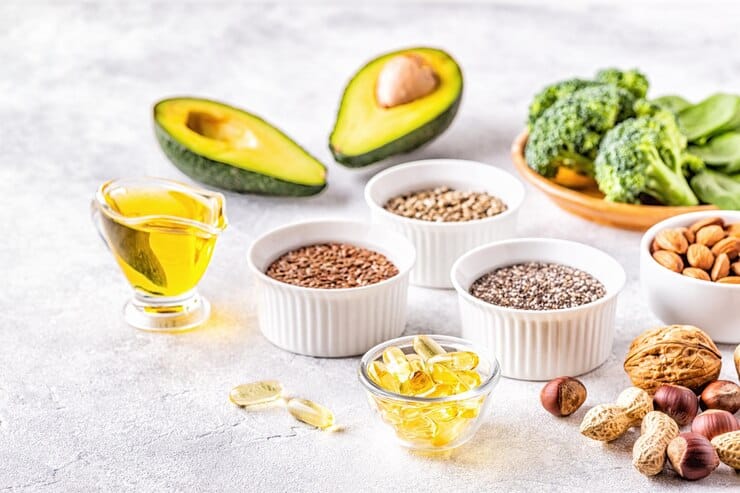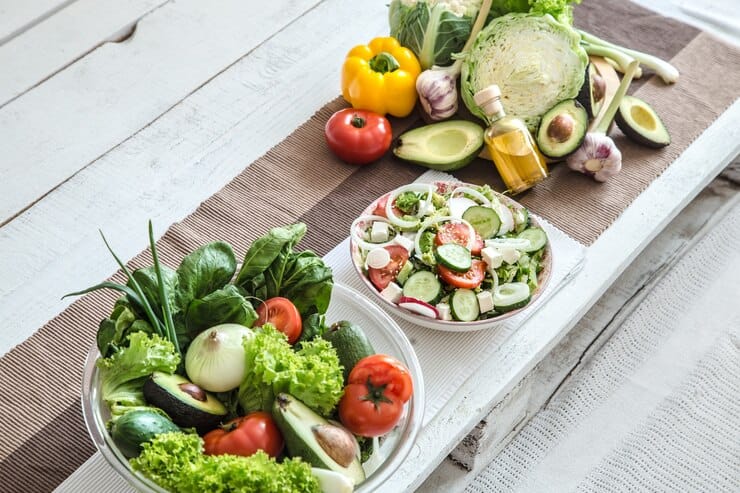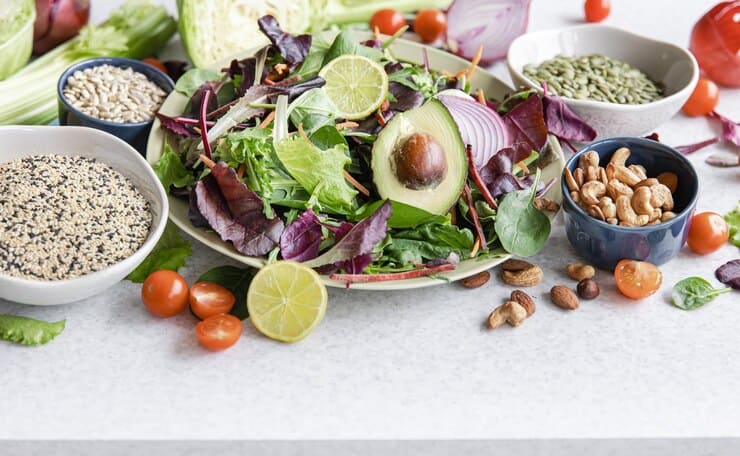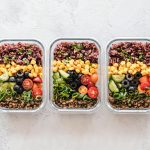Managing eczema on a vegan diet with the potential benefits of a plant-based approach to managing this chronic skin condition. Delve into the connection between diet and eczema, examining how a vegan diet may help alleviate symptoms, including itchiness, dryness, and inflammation. We’ll discuss key dietary considerations, including identifying potential food triggers and incorporating anti-inflammatory foods into your daily meals.
Curious to learn more? Discover which foods may be exacerbating your eczema and explore delicious plant-based recipes that can nourish your skin from within. Learn effective ways to manage eczema, including information on the 7-day eczema diet plan for adults and the 30-day eczema diet. Don’t let eczema control your life – explore the power of a vegan diet and find relief today!
Can a vegan diet cure eczema?
While a vegan diet alone may not be a cure for eczema, it can potentially help manage and reduce symptoms. According to a review published in 2024 by MDPI, vegan diets avoid food groups such as dairy and other animal-based products, which are known to contribute to inflammatory skin diseases, including atopic dermatitis (eczema).
A personal account from Janice Eadie, who switched to a vegan diet, reported significant improvement in her eczema symptoms. She found that eliminating dairy and eggs from her diet led to clearer skin within days. However, it’s important to note that while anecdotal evidence and some studies suggest benefits, more research is needed to establish a definitive link between a vegan diet and eczema remission.

Will a vegan diet help with eczema?
A vegan diet may help manage eczema symptoms, but it’s not a guaranteed cure. Another study highlighted that certain foods, including dairy products, nuts, citrus fruits, and wheat, can worsen eczema symptoms due to their inflammatory properties. By adopting a vegan diet, individuals may avoid these triggers and experience relief from eczema symptoms.
While these studies indicate a positive correlation between a vegan diet and improved eczema symptoms, it’s important to note that more research is needed to establish a definitive link. Consulting with a healthcare professional like Trish Tucker May before making significant dietary changes is always recommended to ensure you’re meeting your nutritional needs and addressing your skin concerns effectively.
What is the best plant-based diet to cure eczema?
One of the most recommended plant-based diets for managing eczema is the whole-food, plant-based diet. This diet focuses on consuming minimally processed foods, primarily from plants, including vegetables, fruits, whole grains, legumes, nuts, and seeds. It excludes animal products and highly processed foods.
A well-known documentary that supports this approach is “Forks Over Knives”. The film explores the connection between diet and health, emphasizing the benefits of a whole-food, plant-based diet in preventing and reversing chronic diseases, including inflammatory skin conditions like eczema.
Medical professionals, such as Dr. Saadia Hussain, a family medicine specialist, also advocate for anti-inflammatory diets to manage eczema. These diets emphasize vegetables, fruits, whole grains, and healthy fats, while avoiding dairy, red meat, and refined sugars.
Does not eating dairy help eczema?
Yes, not eating dairy can help some people with eczema. Dairy is a common allergen, and consuming it can trigger or worsen eczema symptoms for those who are allergic1. According to Verywell Health, up to 30% of people with eczema also have a food allergy, and dairy is one of the most common culprits. Eliminating dairy from the diet can reduce inflammation and improve symptoms for these individuals.
However, it’s important to note that not everyone with eczema will benefit from avoiding dairy. Some people may not experience any change in their symptoms, and in some cases, certain types of fermented dairy, like yogurt, may actually help due to their probiotic content.
If you suspect dairy is contributing to your eczema, it’s best to consult with a healthcare professional for personalized advice and possibly undergo allergy testing to confirm any food allergies.
Does diet matter with eczema?
Yes, diet can significantly impact eczema for many people. Certain foods can either trigger or alleviate symptoms of eczema, depending on individual sensitivities and nutritional needs. Foods such as berries, leafy greens, nuts, seeds, and fatty fish (if you’re not vegan) are particularly beneficial. Probiotic-rich foods like fermented vegetables can also improve gut health, which is closely linked to skin health.

Can a vegan diet clear skin?
Yes, a vegan diet can help clear skin for some individuals. Another study published in the Journal of Clinical Medicine in 2023 supports these findings, noting that a vegan diet avoids food groups such as dairy and other animal-based products, which are known to contribute to inflammatory skin diseases. The study emphasizes that a well-planned vegan diet can provide all necessary nutrients, vitamins, and minerals to support skin health.
Best Vegan Omega-3 Sources for Eczema-prone Skin
For eczema-prone skin, incorporating plant-based omega-3 sources into your diet can be beneficial due to their anti-inflammatory properties. Here are some of the best vegan omega-3 sources:
- Flaxseeds: Rich in alpha-linolenic acid (ALA), flaxseeds can be added to smoothies, oatmeal, or baked goods.
- Chia Seeds: These tiny seeds are also high in ALA and can be used in puddings, smoothies, or as a topping for salads.
- Walnuts: A handful of walnuts can provide a good amount of omega-3s and can be enjoyed as a snack or added to various dishes.
- Hemp Seeds: These seeds are a great source of omega-3s and can be sprinkled on salads, yogurt, or blended into smoothies.
- Soybeans and Soy Products: Tofu, tempeh, and edamame are excellent sources of omega-3s and can be included in various meals.
- Algal Oil: Derived from algae, this supplement provides DHA and EPA, which are typically found in fish oil, making it a great option for vegans.
Incorporating these foods into your diet can help support skin health and potentially reduce eczema symptoms.

Role of Probiotics for Eczema
Probiotics play a significant role in managing eczema by modulating the immune system and promoting a healthy balance of gut bacteria. Here’s how they can help:
- Immune System Regulation: Probiotics help calm overactive immune cells that contribute to eczema flare-ups. They also increase the activity of immune cells that promote a balanced immune response.
- Gut-Skin Axis: The gut-skin axis is a connection between gut health and skin health. Probiotics support a healthy gut microbiome, which can positively impact skin conditions like eczema.
- Reduction of Inflammation: Probiotics have anti-inflammatory properties that can help reduce skin inflammation associated with eczema.
Studies have shown mixed results, but some research suggests that probiotics, especially multi-strain probiotics, can be effective in both preventing and treating eczema. It’s important to note that while probiotics can be beneficial, they should be used alongside conventional treatments and dietary changes for the best results.
Plant-based Foods to Avoid When Experiencing Eczema
When experiencing eczema, it’s important to be mindful of certain plant-based foods that might trigger flare-ups. Here are some foods to consider avoiding:
- Nightshades: Tomatoes, eggplants, and peppers can cause inflammation in some people with eczema.
- Citrus Fruits: Oranges, lemons, and grapefruits may irritate sensitive skin.
- Dairy Alternatives: Some plant-based milks and cheeses contain additives or preservatives that can trigger eczema.
- Nuts and Seeds: Particularly if you have a known allergy, nuts like almonds, walnuts, and seeds like flaxseeds can cause reactions.
- Soy Products: Tofu, tempeh, and soy milk might not suit everyone with eczema.
- Gluten: While not a plant-based food, gluten can be present in many plant-based products and may exacerbate eczema symptoms.
- Processed Foods: Even if they are plant-based, processed foods often contain additives and preservatives that can trigger eczema.
It’s important to note that everyone’s triggers can be different, so keeping a food diary and working with a healthcare professional or dietitian can help identify specific foods that may be causing flare-ups.

Plant-based Foods that Reduce Eczema Symptoms
Vegetables like spinach, kale, and Swiss chard are rich in antioxidants and anti-inflammatory nutrients. Broccoli, cauliflower, and Brussels sprouts provide essential vitamins and minerals that support skin health. Blueberries, strawberries, and raspberries are packed with antioxidants that can help reduce inflammation. Apples, onions, and capers contain quercetin, a flavonoid known for its anti-inflammatory properties.
Whole grains like oats, barley, and brown rice support gut health, which is linked to skin health. Ginger and turmeric have powerful anti-inflammatory properties and can be added to meals or teas. Rich in healthy fats and vitamins, avocados can help keep the skin moisturized and reduce inflammation. High in beta-carotene and other nutrients, sweet potatoes support overall skin health. Bell peppers are high in vitamins A and C, which are essential for skin repair and health.
How to transition to a vegan diet for eczema relief?
Transitioning to a vegan diet for eczema relief can be a beneficial step for many, as plant-based diets often include anti-inflammatory foods that support skin health. Here’s a step-by-step guide to help you make the transition smoothly:
- Begin by educating yourself about veganism and how it can help with eczema. Identify vegan foods that are rich in nutrients essential for skin health, like omega-3 fatty acids, antioxidants, and fiber.
- Gradually replace animal products with plant-based alternatives. Start with one meal a day and slowly increase to all meals being plant-based.
- Include foods like leafy greens, berries, nuts, seeds, avocados, and whole grains. These foods help reduce inflammation and support skin health.
- Add flaxseeds, chia seeds, hemp seeds, and walnuts to your diet to ensure you’re getting enough omega-3 fatty acids.
- Incorporate probiotic-rich foods like fermented vegetables, miso, and kombucha to support gut health, which can positively impact eczema.
- Ensure each meal includes a balance of carbohydrates, proteins, and fats. For example, a quinoa salad with mixed greens, chickpeas, avocado, and a lemon-tahini dressing.
- Prepare your meals at home to have better control over the ingredients and avoid hidden allergens that might trigger eczema.
- Work with a healthcare professional or registered dietitian to create a tailored meal plan that meets your nutritional needs and supports your skin health.
- Connect with vegan communities online or locally for support, recipe ideas, and motivation.
- Track what you eat and how your skin responds to identify any potential triggers or foods that improve your symptoms.
- Transitioning to a new diet and seeing its effects on eczema may take time. Be patient and consistent with your dietary changes.
Making these changes can help manage and potentially improve eczema symptoms. Always consult with a healthcare professional before making significant dietary changes, especially if you have a chronic condition like eczema.

7-day Eczema Vegan Diet Plan
Here’s a 7-day vegan diet plan specifically designed to help manage eczema symptoms. This plan focuses on anti-inflammatory, nutrient-rich foods to support skin health.
| Day | Breakfast | Lunch | Dinner | Snacks |
| Day 1 | Smoothie with spinach, banana, chia seeds, and almond milk | Quinoa salad with mixed greens, chickpeas, cucumber, and lemon-tahini dressing | Stir-fried tofu with broccoli, bell peppers, and brown rice | Apple slices with almond butter |
| Day 2 | Overnight oats with blueberries, flaxseeds, and almond milk | Lentil soup with kale and carrots, served with a side of gluten-free bread | Baked sweet potato with black beans, avocado, and salsa | Carrot sticks with hummus |
| Day 3 | Avocado toast on gluten-free bread with a side of mixed berries | Chickpea and quinoa bowl with roasted vegetables and tahini sauce | Spaghetti squash with marinara sauce and a side salad | Handful of walnuts |
| Day 4 | Chia seed pudding with mango and coconut milk | Veggie wrap with hummus, spinach, bell peppers, and avocado in a gluten-free tortilla | Stuffed bell peppers with quinoa, spinach, and black beans | Celery sticks with almond butter |
| Day 5 | Smoothie bowl with mixed berries, chia seeds, and coconut flakes | Mixed bean salad with tomatoes, cucumber, and olive oil dressing | Lentil curry with basmati rice and steamed vegetables | Sliced cucumber with guacamole |
| Day 6 | Tofu scramble with spinach, tomatoes, and bell peppers | Quinoa and black bean salad with corn, avocado, and lime dressing | Baked eggplant with chickpeas, tomatoes, and tahini sauce | Handful of pumpkin seeds |
| Day 7 | Buckwheat pancakes with banana slices and maple syrup | Brown rice and vegetable stir-fry with tofu and tamari sauce | Zucchini noodles with pesto and cherry tomatoes | Sliced bell peppers with hummus |
This plan incorporates a variety of fruits, vegetables, whole grains, and plant-based proteins, all of which are beneficial for managing eczema. Each meal is designed to be anti-inflammatory and packed with essential nutrients to support overall health and skin improvement.
Feel free to adjust portion sizes and ingredients to meet your individual needs and preferences. And always consult with a healthcare professional before making significant dietary changes to ensure they align with your health goals.

30-Day Eczema Vegan Diet
Sure! Here’s a comprehensive overview of the 30-day Eczema Vegan Diet, including individuals, research, studies, documentaries, influencers, bloggers, and professionals:
- Kristina David: In her blog post, Kristina shares her journey of healing eczema through a vegan diet that includes kale, spinach, lentils, chickpeas, black beans, and Swiss chard. She eliminated common allergens like dairy, eggs, and gluten and focused on plant-based foods.
- Audrey Enjoli: In her blog, Audrey detailed her meal plans, recipes, and the positive changes she experienced. She noted significant improvements in her skin’s appearance and texture, including reduced redness, less itching, and fewer flare-ups. Audrey attributed these benefits to the anti-inflammatory nature of the vegan diet and the elimination of known allergens and irritants.
- Cleveland Clinic: They discuss how anti-inflammatory diets, including vegan diets, can help manage eczema symptoms.
- Dr. Leslie Baumann: She explores the potential link between plant-based diets and eczema, highlighting the importance of omega-3 fatty acids.
- “What the Health”: This documentary, directed by Kip Andersen and Keegan Kuhn, delves into the impact of diet on health and includes discussions on how a vegan diet can improve skin health. The film explores the potential health benefits of eliminating animal products from the diet, including improved skin conditions like eczema, acne, and psoriasis. It also examines the role of diet in preventing chronic diseases such as diabetes, heart disease, and cancer.
- Kristina David: A wellness blogger who shares her personal journey and tips for managing eczema through diet.
- Audrey Enjoli: A lifestyle blogger who focuses on holistic health and shares her experience with eczema and veganism. Her vegan diet includes kale, spinach, arugula, quinoa, brown rice, and oats.
- Dr. Leslie Baumann: A dermatologist who provides insights into the connection between diet and skin health.
- Healthline: Offers expert advice on managing eczema with a plant-based diet.
What are the potential risks of managing eczema on a vegan diet?
While a vegan diet can offer many benefits, there are potential risks for eczema patients to be aware of:
- Nutritional Deficiencies: Vegan diets can sometimes lead to deficiencies in essential nutrients like vitamin B12, iron, zinc, and omega-3 fatty acids. These nutrients are crucial for skin health and immune function.
- Imbalance of Omega-3 and Omega-6 Fats: Most plant-based omega-3 sources contain alpha-linolenic acid (ALA), which needs to be converted to EPA and DHA in the body. This conversion is inefficient, potentially leading to an imbalance that can affect skin health.
- Low Vitamin D Levels: Since vitamin D is primarily obtained from sunlight and animal products, vegans might have lower levels, which can impact skin health.
- Potential Allergens: Some plant-based foods, like soy and nuts, can be allergens for some individuals and may trigger eczema flare-ups.
- Highly Restrictive Diets: Eliminating entire food groups can lead to a lack of variety and potential nutritional gaps if not carefully planned.
Other Skin Conditions That A Vegan Diet Can Help
A vegan diet can help with several other skin conditions besides eczema. Here are a few:
Acne
Several studies have linked dairy consumption to an increased risk of acne. For instance, a systematic review and meta-analysis of 78,529 children, adolescents, and young adults found that those who consumed dairy products, especially skim milk, had a higher likelihood of developing acne.
Low-glycemic foods cause a slower, more gradual rise in blood sugar levels, which can reduce insulin levels and subsequently decrease the production of sebum, an oily substance that can clog pores and lead to acne.
Psoriasis
A well-balanced, plant-based diet is known to have anti-inflammatory, probiotic, and antioxidant properties. These qualities can help reduce the severity of psoriasis by modulating the immune system and reducing inflammation. A healthy gut microbiome is crucial for overall health, including skin health. Plant-based diets are rich in fiber and prebiotics, which promote the growth of beneficial gut bacteria.
Foods such as fruits, vegetables, whole grains, nuts, and seeds contain anti-inflammatory compounds like antioxidants and phytonutrients that help reduce inflammation in the body. A well-planned plant-based diet can provide all necessary vitamins, minerals, and fatty acids that support skin health. This includes sources of omega-3 fatty acids, vitamin A, vitamin C, and zinc.
Hidradenitis Suppurativa
The anti-inflammatory properties of a vegan diet can be particularly beneficial for managing Hidradenitis Suppurativa (HS). Foods such as berries, leafy greens, and fatty acids found in flaxseeds and chia seeds contain antioxidants and anti-inflammatory compounds that can help reduce the severity and frequency of HS flare-ups.
Additionally, incorporating nutrient-rich plant-based foods like sweet potatoes, bell peppers, and avocados can support skin repair and reduce inflammation. Avoiding processed foods and focusing on whole, natural foods can further enhance the benefits of a vegan diet for HS patients.
Rosacea
Some individuals with rosacea find relief by avoiding trigger foods and adopting an adequate intake of vitamins A, C, and E. This skin condition, characterized by redness, swelling, and acne-like breakouts, can be exacerbated by certain foods and drinks. Common triggers include spicy foods, hot beverages, alcohol, and dairy products.
Best Supplements for Eczema
Here are five vegan supplement products that may help with eczema and can be purchased on Amazon:
1. Nordic Naturals Algae Omega
Nordic Naturals Algae Omega is a vegan omega-3 supplement derived from sustainably sourced microalgae. It provides essential fatty acids, EPA and DHA, which are known for their anti-inflammatory properties and support for cardiovascular, brain, and skin health. This supplement is a plant-based alternative to fish oil, offering the same benefits without the environmental impact.
2. Garden of Life Vitamin Code Raw Vitamin D3
Garden of Life Vitamin Code Raw Vitamin D3 offers a plant-based source of vitamin D3, derived from lichen. This supplement supports immune function, bone health, and muscle function. It is made with whole food ingredients and is free from synthetic binders and fillers, providing a natural way to boost your vitamin D levels.
3. Nature’s Bounty EFA Complex
Nature’s Bounty EFA Complex is a vegan supplement that provides a balanced blend of essential fatty acids, including omega-3 and omega-6, sourced from flaxseed and borage oil. These fatty acids help reduce inflammation, support heart health, and improve skin hydration, making it a valuable addition to any wellness routine.
4. Vitafusion Vitamin C Gummies
Vitafusion Vitamin C Gummies are a delicious and convenient way to get your daily dose of vitamin C. These vegan gummies support immune health, skin repair, and collagen production, helping to maintain overall vitality. They are made with natural fruit flavors and free from artificial sweeteners, making them a tasty and healthy choice.
5. Nature’s Bounty Zinc
Nature’s Bounty Zinc is a vegan supplement that provides a vital mineral for immune function and skin health. Zinc plays a key role in reducing inflammation and promoting wound healing. This supplement supports overall wellness and helps maintain healthy skin, making it a great addition to your daily regimen.
Final Thoughts
Ultimately, a vegan diet is not just about exclusion but embracing a wealth of plant-based foods that nourish and heal your body. Remember, every individual’s response to dietary changes is unique, so it’s crucial to monitor your progress and make adjustments as needed. With dedication and the right approach, you can enjoy the benefits of a vegan lifestyle while effectively managing eczema and other skin conditions.





